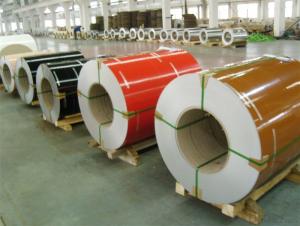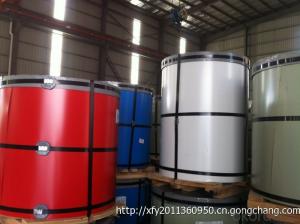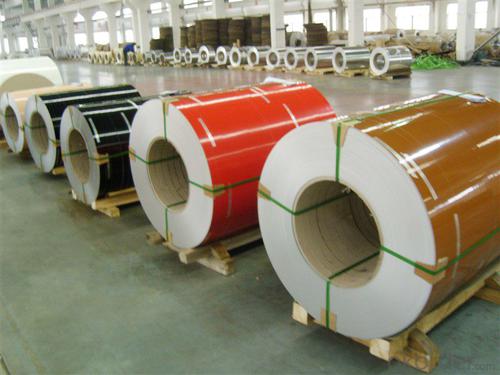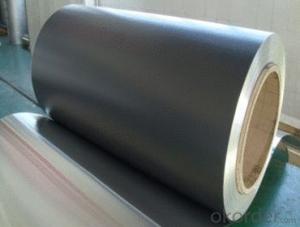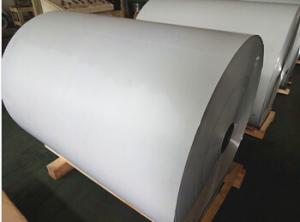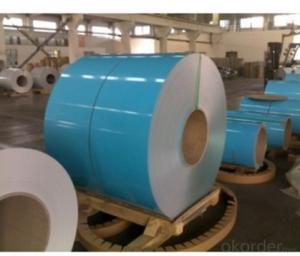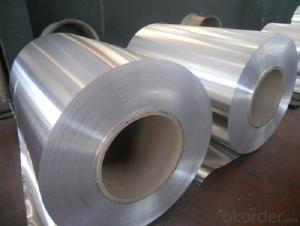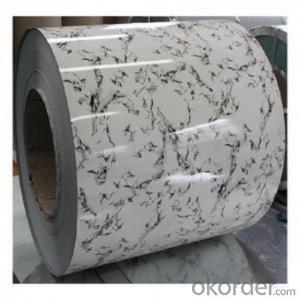PVEF Color Coating Aluminum Coil with High Quality
- Loading Port:
- Shanghai
- Payment Terms:
- TT OR LC
- Min Order Qty:
- 5 m.t.
- Supply Capability:
- 10000 m.t./month
OKorder Service Pledge
OKorder Financial Service
You Might Also Like
Specification
1. Specification of PVEF Color Coating Aluminum Coil with High Quality
Material | Alloy Aluminum 6063,6061,6005 or customer nominated |
Temper | T3, T4, T5, T6 |
Surface | Anodize, electrophoresis, powder coating, PVDF coating, wood grain painting, matted, etc. |
Colour | Any colour based on Standard Germany RAL Mark |
Length | Coating 6.5 meters, Anodizing 6.5 meters, Mill finish 5 meters |
Press Machine | 500-4000 tons all together 64 press lines. |
Fabrication | 1. Windows and doors; 2. Drilling; 3. Bending; 4. Cutting; 5. etc. |
Certificate | ISO 9001 |
Moulding | 1. Using our moulds, no fee; |
2. Using customer drawing, opening mould, usually about 10~50 tons then the moulding can be refunded. | |
3. Mould cost is negotiable base on the order quantity | |
Capability | Annual output 100,000 tons |
2. Application of PVEF Color Coating Aluminum Coil with High Quality
(1).Interior: wall cladding, ceilings, bathrooms, kitchens and balconies, shutters, doors...
(2).Exterior: wall cladding, facades, roofing, canopies, tunnels,column covers , renovations...
(3).Advertisement: display platforms, signboards, fascia, shop fronts...
3. Feature of PVEF Color Coating Aluminum Coil with High Quality
*Such coil is specially designed to replace aluminum ingot, due to the high export tax of aluminum ingot, the coil has better price than ingot.
*This type of coil can fit customer's remelting furnace just like ingot, no need to make any change to the production line that was previously used for ingot. The standard coil size and weight is very suitable for the feed gate of furnace.
*This type of coil causes less material wastage than ingot when remelted.
*Our coil is made directly from ore, no need to go though the ingot making process, quality is much better than other suppliers who use ingot scrap to make coil.
Be free from Oil Stain, Dent, Inclusion, Scratches, Stain, Oxide Dicoloration, Breaks, Corrosion, Roll Marks, Dirt Streaks and other defect which will interfere with use
4. Certificate:
SGS and ROHS(if client request, paid by client), MTC(plant provided), Certificate of Origin(FORM A, FORM E, CO), Bureau Veritas and SGS (if client request, paid by client), CIQS certificate
5. Image of PVEF Color Coating Aluminum Coil with High Quality
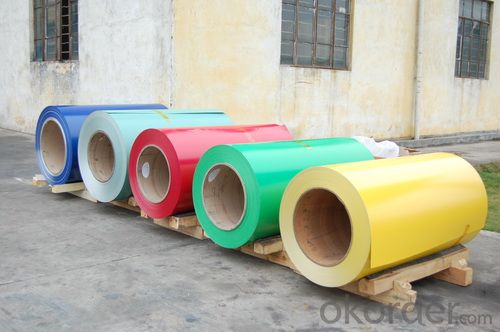
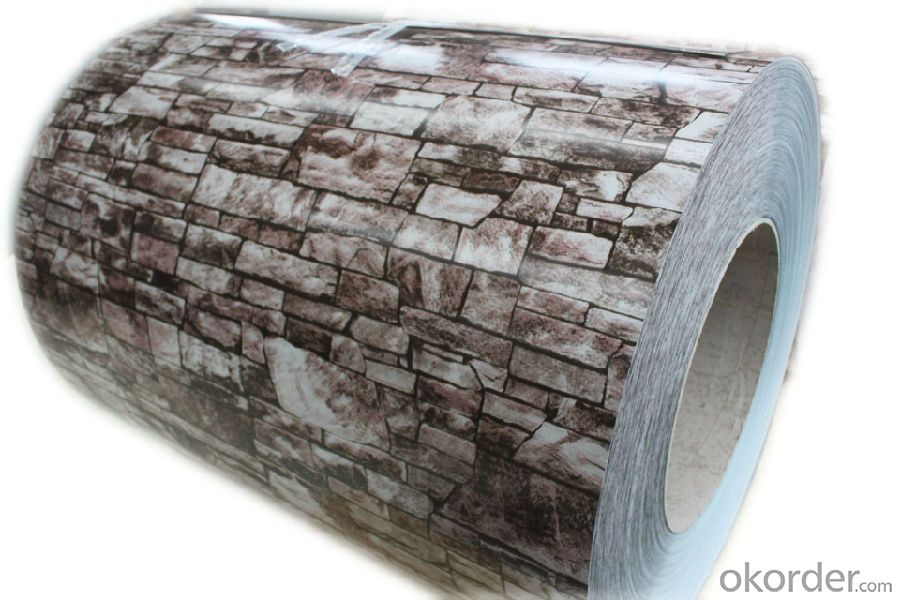
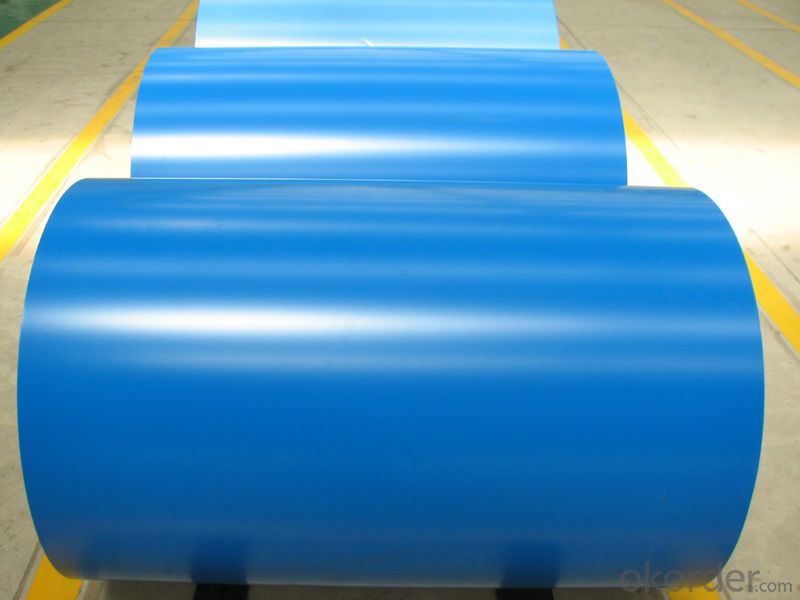
6. Package and shipping of PVEF Color Coating Aluminum Coil with High Quality
eye to wall
eye to the wall
with wood pallet (wooded case also available)
7. FAQ
1) What is the delivery time?
Dpends on actual order, around 20 to 35 days
2)What is the QC system:
We have QC staff of 20 persons and advanced equipment, each production is with MTC traced from Aluminum ingot lot.
3) What market do you mainly sell to?
Australia, America, Asia, Middle East, Western Europe, Africa etc
- Q: How long do aluminum coils typically last?
- The typical lifespan of aluminum coils is approximately 15 to 20 years, but their longevity is heavily influenced by various factors including the quality of the aluminum, the installation process, and the maintenance and care given to them. The lifespan of the coils can be significantly prolonged by regularly maintaining them, such as by cleaning the coils and ensuring adequate airflow. Moreover, their durability can also be affected by environmental factors like exposure to severe weather conditions and corrosive substances. Hence, ensuring proper care and maintenance is crucial to guarantee the extended lifespan of aluminum coils.
- Q: How are aluminum coils coated or finished?
- Aluminum coils can be coated or finished in various ways to enhance their appearance, protect against corrosion, or improve their functionality. The most common methods of coating or finishing aluminum coils include painting, anodizing, and laminating. Painting is a popular coating method where a layer of paint is applied onto the aluminum surface. This can be done through different techniques such as spray painting, roll coating, or coil coating. The paint can be customized in terms of color, gloss level, and texture, allowing for a wide range of aesthetic options. Additionally, painting can provide protection against atmospheric conditions and increase the durability of the coils. Anodizing is another widely used technique, especially for architectural and industrial applications. It involves creating a controlled oxide layer on the surface of the aluminum through an electrochemical process. Anodized aluminum coils have a uniform and durable finish that enhances their resistance to corrosion, scratching, and fading. They are available in various colors and can be further enhanced with a matte, brushed, or polished appearance. Laminating is a process where a thin layer of protective film is applied onto the surface of the aluminum coil. This film can be made of different materials such as PVC, polyester, or polyethylene. Laminating provides an extra layer of protection against scratches, dirt, and UV radiation. It also allows for easy cleaning and maintenance of the coated aluminum coils. In addition to these methods, aluminum coils can also be coated with specialized finishes for specific applications. For example, coils used in the automotive industry may have a polymer-based coating that provides lubricity and reduces friction. Coils used in the construction industry may have a heat-reflective coating to improve energy efficiency. Overall, the coating or finishing of aluminum coils plays a crucial role in enhancing their appearance, protecting against corrosion, and improving their functionality for various applications. The choice of coating method depends on the desired outcome, budget, and specific requirements of the end-use industry.
- Q: Can aluminum coils be painted or coated after installation?
- Yes, aluminum coils can be painted or coated after installation. Aluminum is a versatile material that can be easily painted or coated to enhance its appearance or provide additional protection. Painting or coating aluminum coils after installation can help prevent corrosion, improve durability, and provide a customized finish. The type of paint or coating used will depend on the specific requirements and desired outcome. It is important to ensure that the aluminum surface is properly cleaned and prepared before applying any paint or coating to ensure adhesion and longevity.
- Q: Can aluminum coils be used in aerospace applications?
- Yes, aluminum coils can be used in aerospace applications. Aluminum is a widely used material in the aerospace industry due to its lightweight and high strength-to-weight ratio. Aluminum coils are often used in the construction of aircraft structures, such as fuselages, wings, and landing gear, as well as in heat transfer and cooling systems. Their excellent corrosion resistance and high thermal conductivity make them suitable for various aerospace applications. Additionally, aluminum coils can be easily formed and fabricated, allowing for complex shapes and designs required in aerospace components.
- Q: Can aluminum coils be used for electrical transformers?
- Indeed, electrical transformers can utilize aluminum coils. The application of aluminum as a material for transformer coils is attributed to its superior electrical conductivity and cost-effectiveness in comparison to copper. Traditionally, copper has been favored for transformer windings; nevertheless, the utilization of aluminum has gained traction in recent times due to its lighter weight and more affordable price. Additionally, aluminum coils offer advantages in terms of thermal conductivity, as they efficiently dissipate heat in contrast to copper. Nevertheless, it is crucial to take into account the specific demands and design considerations of the transformer, as the decision between aluminum and copper coils may hinge upon factors such as voltage, current, size, and insulation requirements.
- Q: What is the maximum coil weight that can be produced?
- The maximum coil weight that can be produced depends on various factors such as the type of material being coiled, the dimensions of the coil, and the capacity of the coiling equipment. Without specific details, it is difficult to provide an exact answer.
- Q: How are aluminum coils used in the manufacturing of appliances?
- Aluminum coils are widely used in the manufacturing of appliances due to their unique properties and versatility. They are primarily used in the production of heat exchangers, which are essential components in appliances such as refrigerators, air conditioners, and heaters. One of the main advantages of aluminum coils is their excellent thermal conductivity. This means that they can efficiently transfer heat from one area to another, making them ideal for applications where heat exchange is required. In appliances, aluminum coils help in cooling or heating processes by transferring heat between the refrigerant or coolant and the surrounding air or water. Furthermore, aluminum coils offer superior corrosion resistance compared to other metals, making them highly suitable for appliances that come into contact with moisture or other corrosive substances. This property ensures the durability and longevity of the appliances, as the coils are less likely to rust or corrode over time. Moreover, aluminum coils are lightweight, which contributes to the overall efficiency of appliances. The lightweight nature of aluminum reduces the energy required for transportation and installation, making it a more sustainable choice. Additionally, the lightweight coils allow for more compact designs, maximizing space utilization in appliances. Another advantage of aluminum coils is their malleability. They can be easily shaped and formed into different sizes and configurations, allowing for customized designs that suit specific appliance requirements. This flexibility in design enables manufacturers to create efficient heat exchangers that fit into the limited space available in appliances. In summary, aluminum coils are used in the manufacturing of appliances due to their excellent thermal conductivity, corrosion resistance, lightweight nature, and malleability. These properties make them an ideal choice for heat exchangers, which are crucial components in appliances that require efficient cooling or heating processes.
- Q: Can aluminum coils be used in food processing or packaging?
- Yes, aluminum coils can be used in food processing or packaging. Aluminum is widely used in the food industry due to its excellent properties such as being lightweight, non-toxic, and resistant to corrosion. These properties make it an ideal material for food processing and packaging applications. Aluminum coils can be used to make various food packaging products such as cans, lids, foils, and trays. They provide a barrier against oxygen, moisture, and light, which helps to preserve the freshness and quality of food products. Additionally, aluminum coils are easy to shape, form, and seal, allowing for efficient and effective packaging solutions. Overall, aluminum coils are a popular choice for food processing and packaging due to their versatility, durability, and safety.
- Q: Are aluminum coils suitable for decorative purposes?
- Aluminum coils are indeed appropriate for decorative purposes. Aluminum possesses versatility as a material, enabling it to be effortlessly shaped into different sizes and forms, which renders it suitable for decorative applications. Its lightweight characteristic, endurance, and resistance to corrosion make it an optimal selection for both interior and exterior decorative projects. Moreover, aluminum can undergo various finishes and coatings, such as powder coating or anodizing, to enhance its visual allure. These coatings present a wide array of colors, textures, and patterns, thereby facilitating boundless design possibilities. Furthermore, aluminum coils can be effortlessly manipulated into intricate designs, qualifying them for decorative elements like trims, accents, panels, or even sculptures. In summary, aluminum coils provide a cost-effective, long-lasting, and visually pleasing alternative for diverse decorative purposes.
- Q: My boyfriend sweats a lot and uses Mitchlum deodorant, a lot of it, under his armpits and waits til it dries to stop the sweating. I heard aluminium was bad for you, but he says natural deodorants don't work as well. What do you think?
- Aluminium is bad for you and too much aluminium can cause Alzheimer's disease and other problems. External deodorants are displaced by your perspiration and don't last long. Liquid chlorophyll is an internal deodorant that deodorises your body odours and perspiration odours before they come out of your pores. A table spoon of high strength liquid chlorophyll every day is all you need. Liquid chlorophyll also has a cooling effect so you perspire a bit less. You can find further information in a search for liquid chlorophyll + deodorant.
Send your message to us
PVEF Color Coating Aluminum Coil with High Quality
- Loading Port:
- Shanghai
- Payment Terms:
- TT OR LC
- Min Order Qty:
- 5 m.t.
- Supply Capability:
- 10000 m.t./month
OKorder Service Pledge
OKorder Financial Service
Similar products
Hot products
Hot Searches
Related keywords
